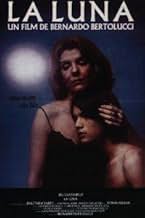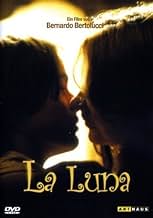Not many discuss Bertolucci's La Luna as one of his most challenging films but I beg to differ. In 1979 I presume the film's campy allure had not been registered but today it's all to be seen; call it kitsch or ironic, but la Luna encapsulates two worlds Bertolucci tried to negotiate in most of his films - the world of appearances and surfaces against the inner world of the protagonist. La Luna plays both against each other as a masquerade, because what we think we are getting is not what we really are seeing. Bertolucci presents the first part as a post-Freudian fable in late 70s Rome where an Opera singer and her son indulge in an Oedipal relationship. Bertolucci then introduces the lost but real father to the scene as if to eradicate Freudian psychoanalysis as a spurious retelling of Greek myth. It seems the son only wants his father's recognition and love, while the mother is marginalized. It's a very masculine thesis for Bertolucci, one that reinforces the illusory fundamentals of Patriarchy, while negating the matriarchal as a mere bypass to the final journey(father's love).
Jill Clayburgh's acting is off-key most of the time but this unwittingly invests the film with its latter-day camp quality, while Matthew Barry looks dazed and confused throughout the entire film. Rome is undoubtedly the best part of the film as well as the sumptuous visuals that capture its sun-drenched beauty and decaying but grand monuments.































